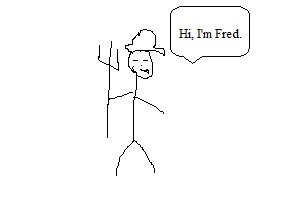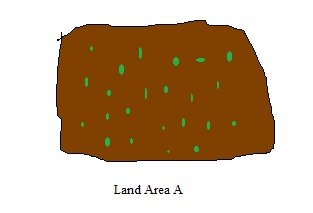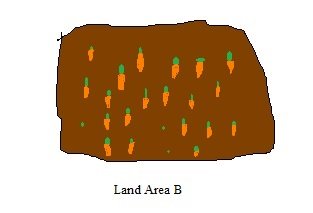
Guys, meet Fred, the farmer.

Fred is a part of a farming community, where everyone works on and shares the same piece of land.
The land is split into two parts, and farmers in the community are free to choose where they want to work, and can take home whatever harvests they get.
This is land area A.

Land area A is nice, futile land, but still requires a lot of work and patience before it can reap any harvests.
This is land area B.

Land area B is already full of fully grown, delicious carrots (yes, those are carrots).
Where would Fred like to work? Of course, Fred would like to work on land area B. Instead of spending the time and effort growing the seeds in land area A, Fred can just take the already grown carrots from land area B and sell them. Great, right?
Well, Fred and all his farmer friends farmed their hearts out on land area B. In the end, the seeds on land area A died out, and this is what became of land area B:

The moral of the story is, in order for a community to be successful, the interest of the individual and community must be aligned. If individual interests conflict with the interest of the community, then it will be very hard for the community to succeed.
Right now, we are seeing a conflict of interests between curators and the Steem community. Originally, curation was meant to be a way for great content to be discovered. The curator, or discoverer is compensated for discovering great content, and the community gets to fully take advantage of that content.
However, with the way curation works now, curators have no incentive to discover new, hidden posts. Trying to find good and interesting content from the plethora of posts every hour is extremely hard work. Meanwhile, it is much easier, and much more rewarding to simply follow Power posters, whose posts are consistently doing extremely well, and upvote their new posts as soon as they come out. A simple bot could execute this strategy perfectly without any additional work by the person, and this method almost always guarantees a good payout to the "curator".
But the thing is, curating posts that are already popular does not benefit the community at all. We would've discovered content from these popular posters without the curation anyway. Curating these posts give very little value to the community.
Furthermore, because there is a lot more incentive for curators to curate these already popular posters and their posts, it becomes even harder for less well known posters to be found, even if they have amazing content. As a result, these posters, who could've been great assets to Steem, end up leaving.
For good content writers to stay in Steem, there must be a good discovery mechanism.
On the other hand, for posters who already have an established presence on Steem, they don't really need the help of curators to make their content visible anymore. So why are curators still taking away the same chunk of value that these posters create?
@dan, @ned and other devs, was curation rewards not designed to help content discovery, instead of leeching off the success of power posters?
I believe we need a overhaul of the algorithm that determines curation rewards vs posting rewards.
First, we note that there are three main groups of people to consider:
For a good content creator who is just starting out and not well known, hoping to hit the jackpot and make big money from one or two posts is not their primary concern. Rather, they want a better way for their content to be discovered, so that they can slowly build up a audience and provide consistent value to the community over time.
For top posters who already have an established presence, they no longer depend on curators to help them become visible. Of course, curation does give a measure of how much value their particular post has, and needs to be used to determine how much reward they should get for their post.
Curators are they key to the success of Steemit. If good incentives are given such that new, hidden good content can routinely be discovered, Steemit can flourish. If not, Steemit will end up stagnating.
To align the interest of all three groups, I believe the solution is that the algorithm needs to take into consideration how established the poster is, and to distribute rewards based on this value.
If a poster is relatively unknown, then curators should get a higher percentage of the rewards, should the post gain any
If a poster is already well established, then curators should get a lower cut of the rewards, as the value they provided is much lower than if they discovered good content from a new creator.
Great post and explanation!
I did a video kind of about this too.. check it out and please let me know what you think :D
https://steemit.com/new/@stealthtrader/steemit-vlog-2
Downvoting a post can decrease pending rewards and make it less visible. Common reasons:
Submit
Great metaphor, and interesting proposal. I like it on the surface, but let's try to dig a bit deeper here in the comments, shall we?
In fact @dan, @ned and the other devs did take content discovery into consideration which is why rewards are higher for curators who vote earlier (as in, before other voters and outside of the 30 minute grace period) during a post's lifetime. However, as you've pointed out perhaps that's not enough.
There is an issue here, however, with your implementation. You would be helping the "rich get richer" as they say, and making it harder for the unknown, "poor" folk to get ahead.
I say this because you don't just take away rewards, since all rewards are cut out of a certain pool. If you're giving less rewards to the curator, you'd be giving more to the well-known content creator. If you increase rewards to the curators, you're taking away more from the unknown content creator.
So there's still more to hash out here before I think this proposal is ready to be considered fully.
Downvoting a post can decrease pending rewards and make it less visible. Common reasons:
Submit
It totally make sense though, because for the unknown poster, what they need is discovery, not an immediate pay out. In exchange for some of the payout, they get to be discovered. This is actually a really good deal for them.
Where as for already well established posters, why do they need to give curators so much of the pie? They don't really need curators' help. So, they should get a bigger share.
Downvoting a post can decrease pending rewards and make it less visible. Common reasons:
Submit
All aboard the steemtrain!
Downvoting a post can decrease pending rewards and make it less visible. Common reasons:
Submit
Loving the metaphor here, and it seems to be accurate from what I can tell so far of my experience with Steemit. I'll be bookmarking this to read in more detail when I get off work, but I really like the approach this post takes.
Downvoting a post can decrease pending rewards and make it less visible. Common reasons:
Submit
I agree that curators are the most important part, we need to get the best content to the front.
Downvoting a post can decrease pending rewards and make it less visible. Common reasons:
Submit
A strategy for newbies could also be to share their first steem posts in other social media environments to entice their friends.
When they spice them up with some great posts about what is so great about steem and keep sharing to their familiar environments their respective social tribe will eventually end up upvoting their great steem posts after they've created their own accounts and start engaging.
Then those tribes can upvote each others posts within Steem and attract more steem upvote power after having had that kickstart.
I'll test that strategy myself and report back how I'm doing ;-)
Downvoting a post can decrease pending rewards and make it less visible. Common reasons:
Submit
yes, that is a strategy. It works if you have a considerable following. But if the people you can get is not that many, ultimately it doesn't really do too much. You need to get the attention of someone with a lot of Steem Power (a whale) if you really want to be noticed.
Downvoting a post can decrease pending rewards and make it less visible. Common reasons:
Submit
A system might be based on the average new post value. Maybe you should only get full curation rewards when a post goes over the posters average. This would encourage voting on throse posters with a low average but would still give credit to those posts of the known posters who are really good.
Then
Downvoting a post can decrease pending rewards and make it less visible. Common reasons:
Submit